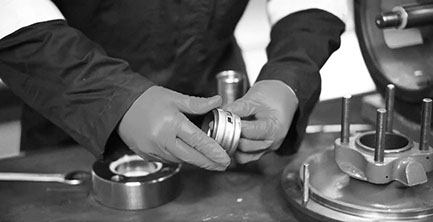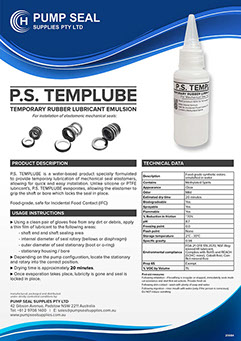Standard Seal Range
> Water Pump Seals
> Rubber Bellow Seals
> Diaphragm Seals
> Multi-Spring Seals
> Wave-Spring Seals
> External Seals
> Metal Bellow Seals
> Parallel Spring Seals
> Conical Spring Seals
> Stationaries
Seals by Brand
> Common Brands
> Other Brands
> ALBIN
> AQUAPLUS
> AUSSIE
> BIANCO
> CALPEDA
> CNP
> CORNELL
> CSF INOX
> DAB
> DAVEY
> DONJOY
> EBSRAY
> FLOMAX
> FORRERS
> FYBROC
> GAAM
> GODWIN
> GOULDS
> HAIGH
> HILGE
> HONDA
> INDENG
> JABSCO
> JAVELIN
> JEC
> MASOSINE
> NASH
> ONGA
> PIONEER
> REGENT
> ROBUSCHI
> SAER
> SEEPEX
> SELWOOD
> SHERWOOD
> SIHI
> SPECK
> STALKER
> STANDART
> SYKES
> TSURUMI
> VARISCO
> VIKING
> WANGEN
> WAUKESHA
> ZENIT
Seals by Type
> Pump Type
Seal Refurbishment Services
Elastomer Chemical Compatibility
Seal Face Chemical Compatibility
SEAL LUBRICANTS

The question of which lubricant or lubrication technique is appropriate for mechanical seal installation is often asked.
Some recommend using only detergent whilst others insist on using grease. We put an end to this discussion by answering the question once and for all. The answer depends on how the secondary seal makes contact with the shaft. These generally fall into two categories:
RUBBER BELLOWS SEALS:
For rubber bellows seals and other elastomeric designs including diaphragm seals, we recommend using a temporary lubricant such as:

P.S. TEMPLUBE
P.S. TEMPLUBE is an in-house manufactured water-based product specially formulated to provide temporary lubrication of mechanical seal elastomers, allowing for quick and easy installation. Unlike silicone or PTFE lubricant's, P.S. TEMPLUBE evaporates, allowing the elastomer to grip the shaft (or bore) and locks the seal in place.
P.S. TEMPLUBE is food-grade, and safe for Incidental Food Contact (IFC)
For more information, see our technical data sheet
In the absence of temporary lubricant, detergent, soapy water or glycol / water mix makes a reasonable substitute although improper mixtures may cause premature seal failure.
AVOID: the use of heavy oil, silicone or PTFE-based lubricants when installing rubber bellows mechanical seals. As these lubricants can come in contact with the sealing faces and are difficult to remove, when the is started these products eventually build up which leads to premature seal failure.
O-RING SEALS:
Unlike rubber bellows, o-ring seals rely on components like set screws to ensure the necessary positive drive to rotate the seal with the shaft. The o-ring in the rotary needs to be able to slide dynamically up and down the shaft to compensate for seal face wear. For this reason we recommend coating the shaft and o-ring with a suitable industrial grease. As most o-ring seals are used in demanding applications, we recommend:

TALCOR® TT THERMAL SOFT
Talcor TT Thermal Soft is an extreme temperature grease-type lubricant which contains no metallic solids or silicone fluids and ideal for use with mechanical seals. It will not melt, drip or run out during application as reactive polymers increase adhesion to hot metal, thereby ensuring positive lubrication at high temperatures.
SEAL FACES
Back in the day, seal faces mainly used the CAB/CER material combination, and no lubricant was need as the graphite carbon is self-lubricating. However, as hard mating faces have become more mainstream, combinations like silicon carbide (SiC/SiC) may cause excessive heat and noise if the pump dry starts.
For mechanical seals with a hard face combination, we recommend a light, non-contaminable lubricant, such as a silicon-based spray. Avoid using thick oil-based greases applied by hand, as they can contain contaminants like fine particles, which cause excess seal face wear. We find a good product to use is:

CRC 808 SILICONE SPRAY
CRC 808 Silicone Spray is a non-corrosive formula that provides a thin, durable, clear, odourless film that lubricates, protects and eliminates squeaking and binding caused by friction.


